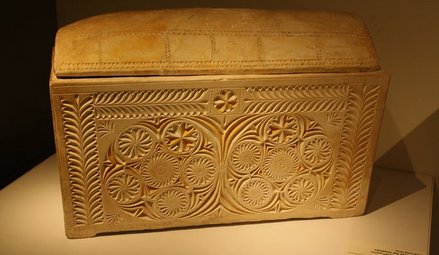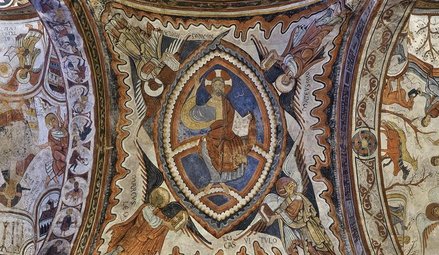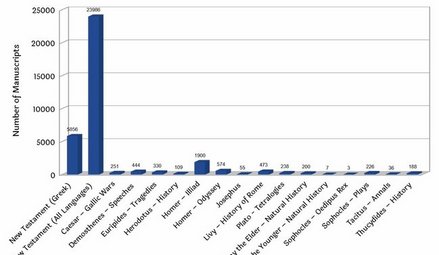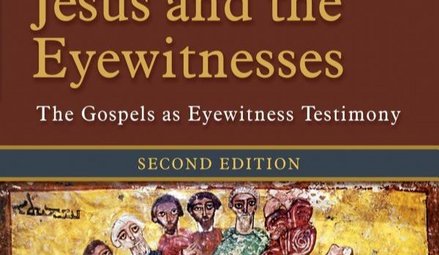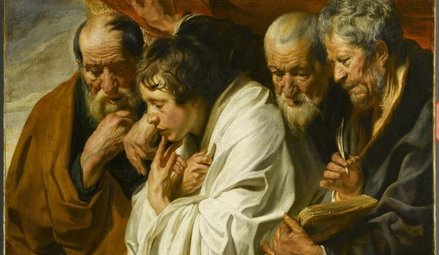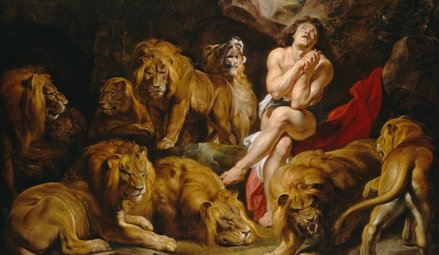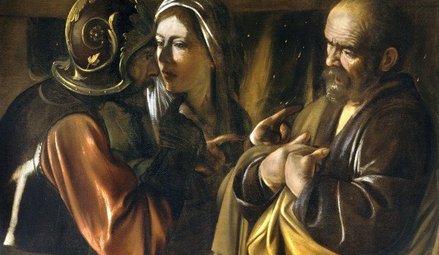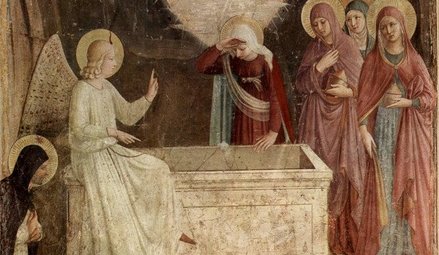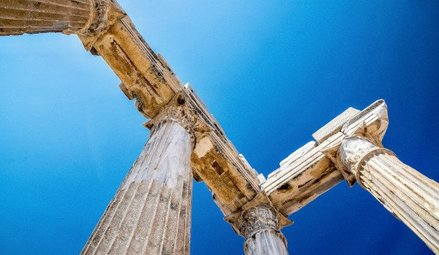- By theme
- Jesus
- The many proofs of Christ’s resurrection
- Saint Thomas Aquinas: God gave all the divine proofs we needed to believe
- The surpassing power of Christ's word
- Lewis’s trilemma: a proof of Jesus’s divinity
- God saves: the power of the holy name of Jesus
- Jesus spoke and acted as God's equal
- Jesus' divinity is actually implied in the Koran
- Jesus came at the perfect time of history
- Rabbinical sources testify to Jesus' miracles
- Mary
- The Church
- The Bible
- An enduring prophecy and a series of miraculous events preventing the reconstruction of the Temple
- The authors of the Gospels were either eyewitnesses or close contacts of those eyewitnesses
- Onomastics support the historical reliability of the Gospels
- The New Testament was not altered
- The New Testament is the best-attested manuscript of Antiquity
- The Gospels were written too early after the facts to be legends
- Archaeological finds confirm the reliability of the New Testament
- The criterion of embarrassment proves that the Gospels tell the truth
- The dissimilarity criterion strengthens the case for the historical reliability of the Gospels
- 84 details in Acts verified by historical and archaeological sources
- The unique prophecies that announced the Messiah
- The time of the coming of the Messiah was accurately prophesied
- The prophet Isaiah's ultra accurate description of the Messiah's sufferings
- Daniel's "Son of Man" is a portrait of Christ
- The Apostles
- Saint Peter, prince of the apostles
- Saint John the Apostle: an Evangelist and Theologian who deserves to be better known (d. 100)
- Saint Matthew, apostle, evangelist and martyr (d. 61)
- James the Just, “brother” of the Lord, apostle and martyr (d. 62 AD)
- Saint Matthias replaces Judas as an apostle (d. 63)
- The martyrs
- The protomartyr Saint Stephen (d. 31)
- Polycarp, bishop of Smyrna, disciple of John and martyr (d. 155)
- Saint Blandina and the Martyrs of Lyon: the fortitude of faith (177 AD)
- Saint Agatha stops a volcano from destroying the city of Catania (d. 251)
- Saint Lucy of Syracuse, virgin and martyr for Christ (d. 304)
- Thomas More: “The king’s good servant, but God’s first”
- The martyrdom of Paul Miki and his companions (d. 1597)
- The martyrs of Angers and Avrillé (1794)
- The Martyrs of Compiègne (1794)
- The Vietnamese martyrs Father Andrew Dung-Lac and his 116 companions (17th-19th centuries)
- He braved torture to atone for his apostasy (d. 1818)
- Blaise Marmoiton: the epic journey of a missionary to New Caledonia (d. 1847)
- José Luis Sanchez del Rio, martyred at age 14 for Christ the King (d. 1928)
- Saint Maximilian Kolbe, Knight of the Immaculate (d. 1941)
- The monks
- The Desert Fathers (3rd century)
- Saint Anthony of the Desert, a father of monasticism (d. 356)
- Saint Benedict, father of Western monasticism (d. 550)
- Saint Bruno the Carthusian (d.1101): the miracle of a hidden life
- Blessed Angelo Agostini Mazzinghi: the Carmelite with flowers pouring from his mouth (d. 1438)
- Monk Abel of Valaam's accurate prophecies about Russia (d. 1841)
- The more than 33,000 miracles of Saint Charbel Maklouf (d. 1898)
- Saint Pio of Pietrelcina (d. 1968): How God worked wonders through "a poor brother who prays"
- The surprising death of Father Emmanuel de Floris (d. 1992)
- The prophecies of Saint Paisios of Mount Athos (d. 1994)
- The saints
- Saints Anne and Joachim, parents of the Virgin Mary (19 BC)
- Saint Nazarius, apostle and martyr (d. 68 or 70)
- Ignatius of Antioch: successor of the apostles and witness to the Gospel (d. 117)
- Saint Gregory the Miracle-Worker (d. 270)
- Saint Martin of Tours: patron saint of France, father of monasticism in Gaul, and the first great leader of Western monasticism (d. 397)
- Saint Lupus, the bishop who saved his city from the Huns (d. 623)
- Saint Dominic of Guzman (d.1221): an athlete of the faith
- Saint Francis, the poor man of Assisi (d. 1226)
- Saint Anthony of Padua: "everyone’s saint"
- Saint Rose of Viterbo or How prayer can transform the world (d. 1252)
- Saint Simon Stock receives the scapular of Mount Carmel from the hands of the Virgin Mary
- The unusual boat of Saint Basil of Ryazan
- Saint Agnes of Montepulciano's complete God-confidence (d. 1317)
- The extraordinary conversion of Michelina of Pesaro
- Saint Peter Thomas (d. 1366): a steadfast trust in the Virgin Mary
- Saint Rita of Cascia: hoping against all hope
- Saint Catherine of Genoa and the Fire of God's love (d. 1510)
- Saint Anthony Mary Zaccaria, physician of bodies and souls (d. 1539)
- Saint Ignatius of Loyola (d. 1556): "For the greater glory of God"
- Brother Alphonsus Rodríguez, SJ: the "holy porter" (d. 1617)
- Martin de Porres returns to speed up his beatification (d. 1639)
- Virginia Centurione Bracelli: When God is the only goal, all difficulties are overcome (d.1651)
- Saint Marie of the Incarnation, "the Teresa of New France" (d.1672)
- St. Francis di Girolamo's gift of reading hearts and souls (d. 1716)
- Rosa Venerini: moving in the ocean of the Will of God (d. 1728)
- Seraphim of Sarov (1759-1833): the purpose of the Christian life is to acquire the Holy Spirit
- Camille de Soyécourt, filled with divine fortitude (d. 1849)
- Bernadette Soubirous, the shepherdess who saw the Virgin Mary (1858)
- Saint John Vianney (d. 1859): the global fame of a humble village priest
- Gabriel of Our Lady of Sorrows, the "Gardener of the Blessed Virgin" (d. 1862)
- Father Gerin, the holy priest of Grenoble (1863)
- Blessed Francisco Palau y Quer: a lover of the Church (d. 1872)
- Saints Louis and Zelie Martin, the parents of Saint Therese of Lisieux (d. 1894 and 1877)
- The supernatural maturity of Francisco Marto, “contemplative consoler of God” (d. 1919)
- Saint Faustina, apostle of the Divine Mercy (d. 1938)
- Brother Marcel Van (d.19659): a "star has risen in the East"
- Doctors
- The mystics
- Lutgardis of Tongeren and the devotion to the Sacred Heart
- Saint Angela of Foligno (d. 1309) and "Lady Poverty"
- Saint John of the Cross: mystic, reformer, poet, and universal psychologist (+1591)
- Blessed Anne of Jesus: a Carmelite nun with mystical gifts (d.1621)
- Catherine Daniélou: a mystical bride of Christ in Brittany
- Saint Margaret Mary sees the "Heart that so loved mankind"
- Mother Yvonne-Aimée of Jesus' predictions concerning the Second World War (1922)
- Sister Josefa Menendez, apostle of divine mercy (d. 1923)
- Edith Royer (d. 1924) and the Sacred Heart Basilica of Montmartre
- Rozalia Celak, a mystic with a very special mission (d. 1944)
- Visionaries
- Saint Perpetua delivers her brother from Purgatory (203)
- María de Jesús de Ágreda, abbess and friend of the King of Spain
- Discovery of the Virgin Mary's house in Ephesus (1891)
- Sister Benigna Consolata: the "Little Secretary of Merciful Love" (d. 1916)
- Maria Valtorta's visions match data from the Israel Meteorological Service (1943)
- Berthe Petit's prophecies about the two world wars (d. 1943)
- Maria Valtorta saw only one pyramid at Giza in her visions... and she was right! (1944)
- The 700 extraordinary visions of the Gospel received by Maria Valtorta (d. 1961)
- The amazing geological accuracy of Maria Valtorta's writings (d. 1961)
- Maria Valtorta's astronomic observations consistent with her dating system
- Discovery of an ancient princely house in Jerusalem, previously revealed to a mystic (d. 1961)
- The popes
- The great witnesses of the faith
- Saint Augustine's conversion: "Why not this very hour make an end to my uncleanness?" (386)
- Thomas Cajetan (d. 1534): a life in service of the truth
- Madame Acarie, "the servant of the servants of God" (d. 1618)
- Blaise Pascal (d.1662): Biblical prophecies are evidence
- Madame Élisabeth and the sweet smell of virtue (d. 1794)
- Jacinta, 10, offers her suffering to save souls from hell (d. 1920)
- Father Jean-Édouard Lamy: "another Curé of Ars" (d. 1931)
- Christian civilisation
- The depth of Christian spirituality
- John of the Cross' Path to perfect union with God based on his own experience
- The dogma of the Trinity: an increasingly better understood truth
- The incoherent arguments against Christianity
- The "New Pentecost": modern day, spectacular outpouring of the Holy Spirit
- The Christian faith explains the diversity of religions
- Cardinal Pierre de Bérulle (d.1629) on the mystery of the Incarnation
- Christ's interventions in history
- Marian apparitions and interventions
- The Life-giving Font of Constantinople
- Our Lady of Virtues saves the city of Rennes in Bretagne (1357)
- Mary stops the plague epidemic at Mount Berico (1426)
- Our Lady of Miracles heals a paralytic in Saronno (1460)
- Cotignac: the first apparitions of the Modern Era (1519)
- Savona: supernatural origin of the devotion to Our Lady of Mercy (1536)
- The Virgin Mary delivers besieged Christians in Cusco, Peru
- The victory of Lepanto and the feast of Our Lady of the Rosary (1571)
- The apparitions to Brother Fiacre (1637)
- The “aldermen's vow”, or the Marian devotion of the people of Lyon (1643)
- Our Lady of Nazareth in Plancoët, Brittany (1644)
- Our Lady of Laghet (1652)
- Saint Joseph’s apparitions in Cotignac, France (1660)
- Heaven confides in a shepherdess of Le Laus (1664-1718)
- Zeitoun, a two-year miracle (1968-1970)
- The Holy Name of Mary and the major victory of Vienna (1683)
- Heaven and earth meet in Colombia: the Las Lajas shrine (1754)
- The five Marian apparitions that traced an "M" over France, and its new pilgrimage route
- A series of Marian apparitions and prophetic messages in Ukraine since the 19th century (1806)
- "Consecrate your parish to the Immaculate Heart of Mary" (1836)
- At La Salette, Mary wept in front of the shepherds (1846)
- Our Lady of Champion, Wisconsin: the first and only approved apparition of Mary in the US (1859)
- Gietrzwald apparitions: heavenly help to a persecuted minority
- The silent apparition of Knock Mhuire in Ireland (1879)
- Mary "Abandoned Mother" appears in a working-class district of Lyon, France (1882)
- The thirty-three apparitions of the Virgin Mary in Beauraing (1932)
- "Our Lady of the Poor" appears eight times in Banneux (1933)
- Fontanelle-Montichiari apparitions of Our Lady "Rosa Mystica" (1947)
- Mary responds to the Vows of the Polish Nation (1956)
- Zeitoun apparitions
- The Virgin Mary comes to France's rescue by appearing at L'Ile Bouchard (1947)
- Maria Esperanza Bianchini and Mary, Mary, Reconciler of Peoples and Nations (1976)
- Luz Amparo and the El Escorial apparitions
- The extraordinary apparitions of Medjugorje and their worldwide impact
- The Virgin Mary prophesied the 1994 Rwandan genocide (1981)
- Our Lady of Soufanieh's apparition and messages to Myrna Nazzour (1982)
- The Virgin Mary heals a teenager, then appears to him dozens of times (1986)
- Seuca, Romania: apparitions and pleas of the Virgin Mary, "Queen of Light" (1995)
- Angels and their manifestations
- Mont Saint-Michel: Heaven watching over France
- Angels give a supernatural belt to the chaste Thomas Aquinas (1243)
- The constant presence of demons and angels in the life of St Frances of Rome (d. 1440)
- Mother Yvonne-Aimée escapes from prison with the help of an angel (1943)
- Saved by Angels: The Miracle on Highway 6 (2008)
- Exorcisms in the name of Christ
- A wave of charity unique in the world
- Saint Peter Nolasco: a life dedicated to ransoming enslaved Christians (d. 1245)
- Saint Angela Merici: Christ came to serve, not to be served (d. 1540)
- Saint John of God: a life dedicated to the care of the poor, sick and those with mental disorders (d. 1550)
- Saint Camillus de Lellis, reformer of hospital care (c. 1560)
- Blessed Alix Le Clerc, encouraged by the Virgin Mary to found schools (d. 1622)
- Saint Vincent de Paul (d. 1660), apostle of charity
- Marguerite Bourgeoys, Montreal's first teacher (d. 1700)
- Frédéric Ozanam, inventor of the Church's social doctrine (d. 1853)
- Damian of Molokai: a leper for Christ (d. 1889)
- Pier Giorgio Frassati (d.1925): heroic charity
- Saint Dulce of the Poor, the Good Angel of Bahia (d. 1992)
- Mother Teresa of Calcutta (d. 1997): an unshakeable faith
- Heidi Baker: Bringing God's love to the poor and forgotten of the world
- Amazing miracles
- The miracle of liquefaction of the blood of St. Januarius (d. 431)
- The miracles of Saint Anthony of Padua (d. 1231)
- Saint Pius V and the miracle of the Crucifix (1565)
- Saint Philip Neri calls a teenager back to life (1583)
- The resurrection of Jérôme Genin (1623)
- Saint Francis de Sales brings back to life a victim of drowning (1623)
- Saint John Bosco and the promise kept beyond the grave (1839)
- The day the sun danced at Fatima (1917)
- Pius XII and the miracle of the sun at the Vatican (1950)
- When Blessed Charles de Foucauld saved a young carpenter named Charle (2016)
- Reinhard Bonnke: 89 million conversions (d. 2019)
- Miraculous cures
- The royal touch: the divine thaumaturgic gift granted to French and English monarchs (11th-19th centuries)
- With 7,500 cases of unexplained cures, Lourdes is unique in the world (1858-today)
- Our Lady at Pellevoisin: "I am all merciful" (1876)
- Mariam, the "little thing of Jesus": a saint from East to West (d.1878)
- Gemma Galgani: healed to atone for sinners' faults (d. 1903)
- The miraculous cure of Blessed Maria Giuseppina Catanea
- The extraordinary healing of Alice Benlian in the Church of the Holy Cross in Damascus (1983)
- The approved miracle for the canonization of Juan Diego Cuauhtlatoatzin (1990)
- Healed by St Charbel Makhlouf, her scars bleed each month for the benefit of unbelievers (1993)
- The miracle that led to Brother André's canonisation (1999)
- Bruce Van Natta's intestinal regrowth: an irrefutable miracle (2007)
- He had “zero” chance of living: a baby's miraculous recovery (2015)
- Manouchak, operated on by Saint Charbel (2016)
- How Maya was cured from cancer at Saint Charbel's tomb (2018)
- Preserved bodies of the saints
- Dying in the odour of sanctity
- The body of Saint Cecilia found incorrupt (d. 230)
- Stanislaus Kostka's burning love for God (d. 1568)
- Blessed Antonio Franco, bishop and defender of the poor (d. 1626)
- The incorrupt body of Marie-Louise Nerbollier, the visionary from Diémoz (d. 1910)
- The great exhumation of Saint Charbel (1950)
- Bilocations
- Inedias
- Levitations
- Lacrimations and miraculous images
- Saint Juan Diego's tilma (1531)
- The Rue du Bac apparitions of the Virgin Mary to St. Catherine Labouré (Paris, 1830)
- Mary weeps in Syracuse (1953)
- Teresa Musco (d.1976): salvation through the Cross
- Soufanieh: A flow of oil from an image of the Virgin Mary, and oozing of oil from the face and hands of Myrna Nazzour (1982)
- The Saidnaya icon exudes a wonderful fragrance (1988)
- Our Lady weeps in a bishop's hands (1995)
- Stigmates
- The venerable Lukarda of Oberweimar shares her spiritual riches with her convent (d. 1309)
- Florida Cevoli: the cross engraved in her heart of flesh (d. 1767)
- Blessed Maria Grazia Tarallo, mystic and stigmatist (d. 1912)
- Saint Padre Pio: crucified by Love (1918)
- Elena Aiello: "a Eucharistic soul"
- A Holy Triduum with a Syrian mystic, witnessing the sufferings of Christ (1987)
- A Holy Thursday in Soufanieh (2004)
- Eucharistic miracles
- Lanciano: the first and possibly the greatest Eucharistic miracle (750)
- A host came to her: 11-year-old Imelda received Communion and died in ecstasy (1333)
- Faverney's hosts miraculously saved from fire
- A tsunami recedes before the Blessed Sacrament (1906)
- Buenos Aires miraculous host sent to forensic lab, found to be heart muscle (1996)
- Relics
- The Veil of Veronica, known as the Manoppello Image
- For centuries, the Shroud of Turin was the only negative image in the world
- The Holy Tunic of Argenteuil's fascinating history
- Saint Louis (d. 1270) and the relics of the Passion
- The miraculous rescue of the Shroud of Turin (1997)
- A comparative study of the blood present in Christ's relics
- Jews discover the Messiah
- Francis Xavier Samson Libermann, Jewish convert to Catholicism (1824)
- Our Lady of the Miraculous Medal and the conversion of Alphonse Ratisbonne (1842)
- Max Jacob: a liberal gay Jewish artist converts to Catholicism (1909)
- Edith Stein - Saint Benedicta of the Cross: "A daughter of Israel who, during the Nazi persecutions, remained united with faith and love to the Crucified Lord, Jesus Christ, as a Catholic, and to her people as a Jew"
- Patrick Elcabache: a Jew discovers the Messiah after his mother is miraculously cured in the name of Jesus
- Cardinal Aron Jean-Marie Lustiger (d. 2007): Chosen by God
- Muslim conversions
- Buddhist conversions
- Atheist conversions
- The conversion of an executioner during the Terror (1830)
- God woos a poet's heart: the story of Paul Claudel's conversion (1886)
- Dazzled by God: Madeleine Delbrêl's story (1924)
- C.S. Lewis, the reluctant convert (1931)
- The day André Frossard met Christ in Paris (1935)
- MC Solaar's rapper converts after experiencing Jesus' pains on the cross
- Father Sébastien Brière, converted at Medjugorje (2003)
- Franca Sozzani, the "Pope of fashion" who wanted to meet the Pope (2016)
- Nelly Gillant: from Reiki Master to Disciple of Christ (2018)
- Testimonies of encounters with Christ
- Near-death experiences (NDEs) confirm Catholic doctrine on the Four Last Things
- The NDE of Saint Christina the Astonishing, a source of conversion to Christ (1170)
- Jesus audibly calls Alphonsus Liguori to follow him (1723)
- Blessed Dina Bélanger (d. 1929): loving God and letting Jesus and Mary do their job
- Gabrielle Bossis: He and I
- André Levet's conversion in prison
- Journey between heaven and hell: a "near-death experience" (1971)
- Alicja Lenczewska: conversations with Jesus (1985)
- Vassula Ryden and the "True Life in God" (1985)
- Nahed Mahmoud Metwalli: from persecutor to persecuted (1987)
- The Bible verse that converted a young Algerian named Elie (2000)
- Invited to the celestial court: the story of Chantal (2017)
- Providential stories
- The superhuman intuition of Saint Pachomius the Great
- Germanus of Auxerre's prophecy about Saint Genevieve's future mission, and protection of the young woman (446)
- Seven golden stars reveal the future location of the Grande Chartreuse Monastery (1132)
- The supernatural reconciliation of the Duke of Aquitaine (1134)
- Saint Zita and the miracle of the cloak (13th c.)
- Joan of Arc: "the most beautiful story in the world"
- John of Capistrano saves the Church and Europe (1456)
- A celestial music comforts Elisabetta Picenardi on her deathbed (d. 1468)
- Gury of Kazan: freed from his prison by a "great light" (1520)
- The strange adventure of Yves Nicolazic (1623)
- Julien Maunoir miraculously learns Breton (1626)
- Pierre de Keriolet: with Mary, one cannot be lost (1636)
- How Korea evangelized itself (18th century)
- A hundred years before it happened, Saint Andrew Bobola predicted that Poland would be back on the map (1819)
- The prophetic poem about John Paul II (1840)
- Don Bosco's angel dog: Grigio (1854)
- Thérèse of Lisieux saved countless soldiers during the Great War
- Lost for over a century, a Russian icon reappears (1930)
- In 1947, a rosary crusade liberated Austria from the Soviets (1946-1955)
- The discovery of the tomb of Saint Peter in Rome (1949)
- He should have died of hypothermia in Soviet jails (1972)
- God protects a secret agent (1975)
- Flowing lava stops at church doors (1977)
- A protective hand saved John Paul II and led to happy consequences (1981)
- Mary Undoer of Knots: Pope Francis' gift to the world (1986)
- Edmond Fricoteaux's providential discovery of the statue of Our Lady of France (1988)
- The Virgin Mary frees a Vietnamese bishop from prison (1988)
- The miracles of Saint Juliana of Nicomedia (1994)
- Global launch of "Pilgrim Virgins" was made possible by God's Providence (1996)
- The providential finding of the Mary of Nazareth International Center's future site (2000)
- Syrian Monastery shielded from danger multiple times (2011-2020)
- Jesus
- Who are we?
- Make a donation
TOUTES LES RAISONS DE CROIRE
La Bible
n°31
Judea
1st century
The unique prophecies that announced the Messiah
Messianic expectation was shaped by a long series of individuals who prophesied, over many centuries and through many inspired, revealed words and figures, the coming of a Messiah king from Israel. The prophecies foretold how this man would change the course of world history, describing his birth, life, death, posterity, mission and even the time of his coming. Nowhere else in human history do we find an expectation of this magnitude and manner, pointing to Jesus, and occurring at the foretold time.
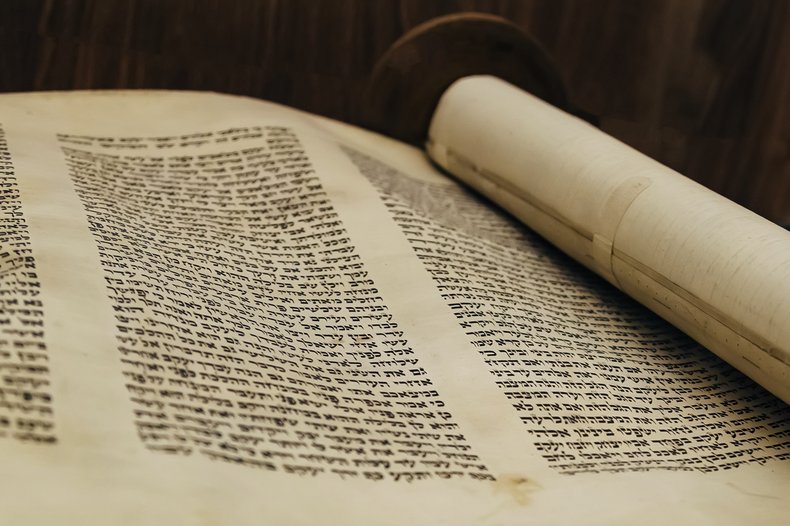
iStock/Getty Images Plus/Vladimir Zapletin
Les raisons d'y croire :
- The messianic prophecies constitute an indisputable historical fact: the small portion of the people of Israel who have yet to recognize Christ, today’s Jewish people, attest to the antiquity and authenticity of all these words, which date from long before the birth of Christ.
- Prophetic promises are scattered throughout the Old Testament, from Adam (Gen 3:15) to David (2 Sam 7:5), and before him Abraham (Gen 22:18), Isaac (Gen 22:8), Jacob (Gen 49:10), Joseph (Gen 50:20), Moses (Deut 18:15), and all the prophets. The prophecies are startlingly accurate, and together provide a complete picture revealing every aspect of the life, being, mystery and mission of Christ
- The prophecies announce, after a Precursor (Mal 3: 1-3; 23-24), the mysterious coming of a "King"; a "humble" and peaceful Messiah (Zech 9: 9-10); a "marvelous" child (Is 9:5); the "Prince of Peace"; his birth "in Bethlehem" (Mic 5: 1-2); his anointing with "the Spirit of God" (Is 11: 1-2; 42: 1); a "new Covenant" (Jr 31: 31); a "Redeemer" in Zion (Is 59: 20), and "a new Earth and new heavens" (Is 65: 17).
- The Messiah is called by divine and lofty names: "Emmanuel (God-with-us)" (Is 7: 10), "strong God", "Father forever" (Is 9: 5), "a Son of Man coming on the clouds of heaven" (Dan 7: 13-14), but he is also described as a suffering "servant" (Is 52: 13), an "object of scorn, forsaken by men, a Man of sorrows, familiar with suffering" (Is 53: 3), "pierced for our transgressions" (Is 53:5), who "will justify the multitudes" (Is 53:11), "because he gave himself up to death and was counted among the criminals, while he bore the sin of the multitudes and interceded for the criminals" (Is 53:12).
Finally, "Because of his anguish he shall see the light" (Is 53:11), "For you will not abandon my soul to Sheol, nor let your devout one see the pit." (Ps 16:10).
His dominion is foretold to extend "from sea to sea, from the River to the ends of the earth" (Ps 72:7-8), which must have seemed extravagant at the time, since Israel was a tiny nation surrounded by great, impressive empires. But the prophets affirm that "His dominion is an everlasting dominion that shall not pass away, his kingship, one that shall not be destroyed" (Dan 7:14).
Synthèse :
The coming, life and mission of the Messiah were heralded by numerous prophecies, figures and images that must, of course, be contextualized and understood within the framework of Jewish tradition at the time of Christ. Without going into overly complicated explanations, a quick overview of these prophetic texts makes it plain that Jesus fulfilled absolutely all Messianic prophecies.
Here are a few of them (taken from the book Jésus le Messie attendu par Israël selon les prophéties bibliques, published by Marie de Nazareth Productions):
- He was to be born in Bethlehem: "And you, Bethlehem Ephrathah, are not the least of the clans of Judah, for from you will be born to me the One who is to reign over Israel" (Mic 5:1-2).
- A miraculous birth was alluded to: "Before she was in labor she gave birth, before the pains came to her she was delivered of a son. Who has ever heard such a thing? Who has ever seen such a thing?" (Is 66: 6-8).
- Bethlehem would also be a place of sadness, with the killing of the Innocents: "A voice in Ramah was heard, weeping and long lamenting: it is Rachel weeping for her children, and she does not want to be comforted, for they are no more" (Jer 31:15).
- The Chosen One would go to Egypt: "At that time, there will be an altar to the Lord in the midst of the land of Egypt, and on the border a monument dedicated to the Lord. It will be a sign and a testimony to the God of hosts in the land of Egypt" (Is 19:19).
- He will be preceded by the coming of a mysterious Forerunner: "Behold, I will send you Elijah the prophet, before the great and dreadful day of the Lord comes. He will turn the hearts of fathers to their sons, and the hearts of sons to their fathers, lest I come and strike the land with anathema" (Mal 3:23-24).
- The Messiah will be a son of Israel: "I see him - but not for now, I see him - but not at close range: a star from Jacob becomes ruler, a scepter rises from Israel" (Num 24:17).
- He will be of the tribe of Judah: "The scepter will not depart from Judah, nor the ruler's staff from between his feet, until tribute is brought to him and the peoples obey him" (Gen 49:10).
- He will be the son of David: "I will keep the lineage of your womb after you, and establish its kingship. He will build a house for My Name, and I will establish his royal throne forever. I will be a father to him, and he will be a son to me. Thy house and thy kingdom shall stand before me for ever, and thy throne shall be established for ever" (2 Sa 7:5-19); "A shoot shall come forth from the stock of Jesse, a bud shall grow out of his roots" (Is 11:1). Christ was indeed "Son of David" through Joseph who was "of the house and seed of David" (Lk 2:4) and through Mary (cf. explanatory article), even though the lineage of David is lost today.
- He will be the Son of God: "I will be a father to him, and he will be a son to me" (2 Sa 7:5-19); "You are my son; today I have begotten you" (Ps 2:7).
- He will indeed be a man, described "like a son of man" (Dan 7:9-14): "Yes, a child is born to us, a son is given to us" (Is 9:5).
- But divine in nature, "coming on the clouds of heaven" (Dan 7:9-14): "The young woman shall name him Emmanuel, that is to say: God-with-us" (Is 7:10-14); "They name him Wonder-Counselor, God-Hero, Father-Forever, Prince of Peace" (Is 9:5); "And the lord whom you seek will come suddenly to his temple" (Mal 3:1-3); "From you shall come forth for me one who is to be ruler in Israel; Whose origin is from of old, from ancient times." (Mic 5:1-2); "I am the Lord, there is no savior but me" (Is 43:11).
- He will be anointed with the Spirit of the Lord, as the Spirit rests on the Son of God from all eternity: "The Spirit of the Lord is upon me, because he has anointed me" (Is 61:1); "Upon him will rest the Spirit of the Lord, the spirit of wisdom and understanding, the spirit of counsel and strength, the spirit of knowledge and of the fear of the Lord" (Is 11:1-2).
- He will be presented in the Temple: "And suddenly he will enter his sanctuary, the Lord whom you seek; and the Angel of the covenant whom you desire, behold, he comes! says the Lord of hosts. Who will stand the day of his coming? Who will stand upright when he appears?" (Mal 3:1-3).
- He will come to found a new covenant: "Behold, the days are coming," says the Lord, "when I will make a new covenant with the house of Israel and the house of Judah. I will put my Law in the depths of their being and write it on their hearts. Then I will be their God and they will be my people. Everyone will know me, from the smallest to the greatest - the Lord declares - because I will forgive their crime and remember their sin no more" (Jer 31:31-34).
- This New Covenant will give rise to another priesthood (cf. Heb 10:4-10): "The Lord has sworn it in an irrevocable oath: 'You are a priest for eternity, according to the order of Melchizedek'" (Ps 110:4).
- The Messiah will first illuminate Galilee: "Where once he degraded the land of Zebulun and the land of Naphtali, now he has glorified the way of the Sea, the land across the Jordan, Galilee of the Nations [...] The people who walked in darkness have seen a great light; Upon those who lived in a land of gloom a light has shone." (Is 8:23 ; 9:1).
- His preaching will reveal the mysteries of God: "I will open my mouth in a parable, unfold the puzzling events of the past" (Ps 78:2); "Not by appearance shall he judge, nor by hearsay shall he decide, but he shall judge the poor with justice, and decide fairly for the land’s afflicted" (Is 11: 3-4).
- This New Covenant will give rise to another priesthood (cf. Heb 10:4-10): "The Lord has sworn that His dominion will extend over all the earth: "His dominion will extend from sea to sea, and from the river to the ends of the earth" (Zech 9:10); "You will rule them with a scepter of iron; like pottery vessels you will break them" (Ps 2:1-9).
- His salvation will reach to the ends of the earth (Is 49:5-6): "Ask, and I will give you the ends of the earth as your domain" (Ps 2:1-9); "He will rule from sea to sea, from the River to the ends of the earth" (Ps 72:8).
- He will inaugurate an eternal Kingdom beyond the Earth: "He received dominion, splendor, and kingship; all nations, peoples and tongues will serve him. His dominion is an everlasting dominion that shall not pass away, his kingship, one that shall not be destroyed" (Dan 7:9-14); "The God of heaven will set up a kingdom that shall never be destroyed or delivered up to another people; rather, it shall break in pieces all these kingdoms and put an end to them, and it shall stand forever." (Dan 2: 39-44).
- All the nations will come to him: "Ask, and I will give you the nations for your inheritance" (Ps 2:1-9); "I will make you a light to the nations, that my salvation may reach to the ends of the earth." (Is 49:3-6), the messianic work that Christ has accomplished once and for all.
- In him, all nations will be blessed: "In your descendants all the nations of the earth will find blessing, because you obeyed my command." (Gen 22:18); "May he be like rain coming down upon the fields, like showers watering the earth, that abundance may flourish in his days, great bounty, till the moon be no more…May his name be forever; as long as the sun, may his name endure. May the tribes of the earth give blessings with his name; may all the nations regard him as favored." (Ps 72:6-7; 17); "I will make you a light to the nations, that my salvation may reach to the ends of the earthI will make you the light of the nations" (Is 49:5-6).
- He will be the Savior of the world: "The LORD, your God, is in your midst, a mighty savior" (Zeph 3:14-17); "Fear not, Jacob, poor worm, Israel, poor mortal. I am coming to help you - the Lord's oracle; your redeemer is the Holy One of Israel" (Is 41: 14); "Then a redeemer will come to Zion, for those in Jacob who turn from their crime. Oracle of the Lord" (Is 59: 20).
- He will be King: "Shout for joy, daughter Zion! sing joyfully, Israel!...The King of Israel, the LORD, is in your midst" (Zeph 3:14-17); "But you, Bethlehem-Ephrathaha least among the clans of Judah, From you shall come forth for me one who is to be ruler in Israel" (Mic 5:1-2); "Upon his shoulder dominion rests" (Is 9:5).
- He will be peaceful: "He shall banish the chariot from Ephraim, and the horse from Jerusalem; The warrior’s bow will be banished, and he will proclaim peace to the nations." (Zech 9:10).
- He will be humble: "Shout for joy, O daughter Jerusalem! Behold: your king is coming to you, a just savior is he, Humble, and riding on a donkey, on a colt, the foal of a donkey." (Zech 9:9).
- For a time, he will be despised, misunderstood, abandoned by men and, in a way, by God: "Object of scorn, avoided by men" (Is 53:3); "Like one from whom you turn your face, spurned, and we held him in no esteem." (Is 53:3); "And we regarded him as punished, smitten by God and humiliated" (Is 53:4); "Among his people, who cared that he was cut off from the land of the living, that he was smitten for the crime of his people?"(Is 53, 8); "The insult broke my heart to the point of collapse. I hoped for compassion, but in vain, for comforters, and I found none" (Ps 68, 21); "My God, my God, why have you forsaken me?" (Ps 21, 2); "All who see me scorn me, they sneer and shake their heads: 'He counted on the Lord: let him deliver him! Let him save him, since he is his friend" (Ps 21:8).
- He will suffer: "A man of sorrows, familiar with suffering" (Is 53:3); "Ill-treated, he humbled himself, he did not open his mouth, like a lamb that lets itself be led to the slaughter, like a mute sheep before the shearers, he did not open his mouth" (Is 53:3); "O you who pass along the way, look and see if there is any sorrow like my sorrow" (Lm 1:12).
- He will be burdened with our sins and sufferings: "He bore our sufferings and was burdened with our sorrows" (Is 53:4); "The Lord laid on him the iniquities of us all" (Is 53:6).
- He will be betrayed: "He who shared my bread raised his hand against me" (Ps 41:10).
- He will be rejected by his people: "The stone which the builders rejected has become the cornerstone; this is the work of the Lord, a marvel in our eyes" (Ps 118:22-23).
- He will be judged: "By constraint and judgment he has been seized" (Is 53:8).
- He will be nailed to the Cross: "They have pierced my hands and my feet, I can count all my bones" (Ps 22:17).
- He will be pierced: "They will look upon him whom they have pierced" (Zech 12:10-12).
- Water will come out of his side: "Behold, water came out of the right side of the Temple, south of the altar. He said to me: 'This water is going to the sea, so that its waters will become fresh. Wherever the river passes, every living thing that swarms in it will live, for this water comes from the sanctuary" (Ez 47:1-12).
- He will be surrounded by thieves: "Dogs surround me; a pack of evildoers closes in on me" (Ps 22:17).
- They will give him vinegar to quench his thirst: "For my thirst they gave me vinegar" (Ps 68:22).
- They will divide his clothes among themselves and cast lots for his garment: "They will divide my clothes among themselves and cast lots for my garment" (Ps 21:19).
- He will die and be buried in a rich man's tomb: "They gave him a grave with the ungodly, and his grave is with the rich, though he did no violence and there was no deceit in his mouth" (Is 53:9).
- He will be mourned: "They will mourn for him as one mourns for an only child, and they will grieve for him as one grieves over a firstborn." (Zech 12:10).
- He will conquer death and rise again: "After the trial his soul has endured, he will see the light and be filled" (Is 53:11); "For you will not abandon my soul to Sheol nor let your devout one see the pit" (Ps 15:10); "He will make death disappear forever" (Is 25:8).
- He will be man's Redeemer: "He was pierced for our transgressions, crushed for our iniquities" (Is 53:5); "The chastisement that gives us peace is upon him, and in his wounds we find healing" (Is 53:5); "Through him the will of the Lord will be accomplished" (Is 53:10); "Through his knowledge, the righteous one, my servant, will justify the multitudes by burdening himself with their iniquities" (Is 53:11); "I will give him his portion among the many, and he shall divide the spoils with the mighty, because he surrendered himself to death, was counted among the transgressors, bore the sins of many, and interceded for the transgressors." (Is 53, 12).
- The Spirit of God will be sent: "I will pour out my spirit upon all flesh. Your sons and daughters will prophesy, your old men will dream dreams, your young men will see visions. Even upon your male and female servants, in those days, I will pour out my spirit." (Joel 3:1-5).
- He will call other peoples: "I will call 'my people' a nation that was not my people" (Hos 2:25, quoted in Rom 9:25).
- We are saved by the wood of his Cross: like the wood of Noah's Ark, like Moses' staff, it is always the wood (the Cross) that helps us cross the water (baptism) to reach the Promised Land.
- Jesus fulfilled the true Sabbath: the Sabbath, from Friday evening to Sunday morning, celebrated God's rest at the end of creation (Gen 2:2; Ex 16:29; 20:8). In the end, it is revealed as an anticipation and announcement of Christ's death and perfect rest. From Friday evening to Sunday morning, Christ rested in death after the new creation.
- He also fulfilled the figure of Moses: Moses announced the coming of a prophet "like himself": "A prophet like me will the LORD, your God, raise up for you from among your own kindred; that is the one to whom you shall listen" (Dt 18:15-18). Christ appears as the new Moses, who draws man from the land of sin through the waters of baptism. He leads us through the desert of this world to the Promised Land of the Kingdom of God, offering the help of the Law of the Spirit engraved in our hearts, the fulfillment of the Law on stone; he offers the nourishment of his Body, the true Bread from heaven, the fulfillment of the manna.
- He fulfilled the figure of Joseph: sold by his brothers, Joseph saves the universe, then finally makes himself recognized by his brothers and weeps, clasping them to his heart (Gn 50:20).
- He fulfilled the figure of Isaac: he is the only Son, whom the Father gave up, like Abraham. He is the Lamb chosen by God, sacrificed on Mount Moriah (Gen 22:8).
- Christ is the priest, altar and victim of the new and eternal Covenant. The New Covenant is made in his own blood. He is the High Priest who has entered the true Temple, in Heaven, once and for all.
- The Church is the bride drawn from Christ's side, plunged into death, just as Eve was drawn from Adam's side, as he was plunged into a mysterious sleep.
- He has announced his coming in glory, which will complete all the prophecies: "All nations will see him" (Mt 24:30). The whole earth will be filled with his glory, the forerunners of this coming being the Gospel preached to the ends of the earth (Mt 24:14), the great apostasy of the world (2 Thess 2:3), and the return of Israel to its land (Lk 21:24).
And that's without taking into account the prophecies concerning the Most Blessed Virgin and the time of the Messiah's coming, which are subjects too broad for this article and which we will present in another chapter.
In conclusion, aside from a few prophecies that will only be fulfilled in eternity, in Heaven - for example, those concerning universal peace, "The wolf shall be a guest of the lamb" (Is 11:6), or the universal knowledge of God, "Everyone will know God, from the smallest to the greatest" (Jer 31:34), "No more evil will be done on my holy mountain" (Is 11:9), etc. - we cannot find a single Messianic prophecy that Jesus did not fully fulfill. That is why the extraordinary fact of the prophecies is one of the great reasons to believe. All that Christ did was indeed done "according to the Scriptures" (cf. Mt 2:5; 11:10; 21:42; 26:24; 26:31; 26:54; Mk 1:2; 7:6; 14:21; 14:27; 14:49; Lk 7:27; 18:31; 20:17; 24:32-46; Jn 1:45; 2:17; 5:39; 5:46; 12:14; Acts 13:29, etc.).
Olivier Bonnassies
Au-delà des raisons d'y croire :
The Church's common prayer and liturgy, throughout the year, demonstrate the extent to which Christ fulfilled and surpassed Israel's expectations, letting us glimpse "the breadth and length and height and depth, and to know the love of Christ that surpasses knowledge, so that you may be filled with all the fullness of God" (Eph 3:18-19).
Aller plus loin :
Video Top 30 Prophecies That Jesus Christ Fulfilled by A&Ω Productions (3 episodes)










